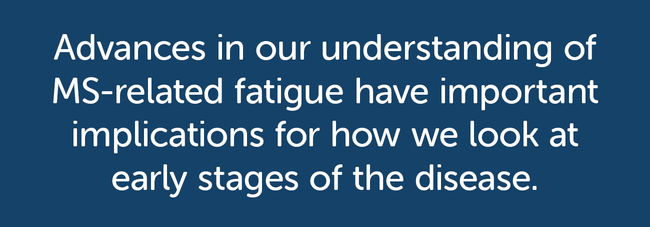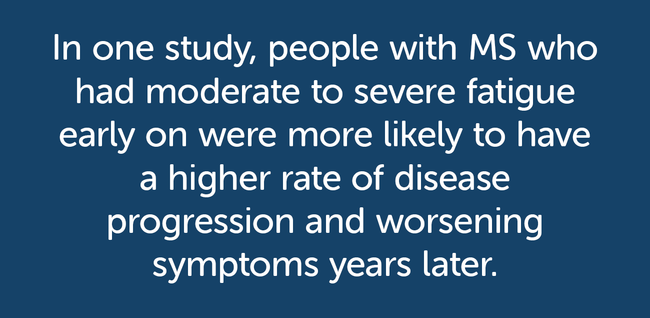
Powered By





 Continue with Facebook
Sign up with your email
Continue with Facebook
Sign up with your email
Research indicates that experiencing fatigue early in the course of multiple sclerosis (MS) may signal a faster progression of the disease. Fatigue is a common and debilitating symptom for people with MS — a chronic, progressive, and often relapsing disease of the brain and spinal cord.
MS is caused by dysfunction in the immune system that promotes inflammatory responses in the central nervous system. As researchers learn more about early MS, new treatments may emerge for managing fatigue and the disease itself.
Clinicians have often ignored fatigue in chronic illnesses such as MS because of the subjective nature of fatigue, energy levels, and tiredness, along with a lack of proven therapeutics to treat these symptoms. But advances in medical science have uncovered a far more nuanced understanding of MS-related fatigue in recent years, with important implications for early stages of the disease.

The results of a study of 235 people with MS indicated that fatigue during the first neurological symptoms of MS was associated with a quicker diagnosis. MS can be difficult to diagnose because it is characterized by a wide range of nonspecific symptoms that manifest in numerous ways. A diagnosis can often take years, while the disease progresses.
In this study, fatigue in people with early MS was shown to increase after a second attack. The study indicated that fatigue with first symptoms of MS, prior to actual diagnosis, was not associated with a higher rate of disease progression and disability. However, fatigue at the time of diagnosis was associated with a higher rate of disability at follow-up.
Another study of more than 5,000 participants with MS featured approximately half who reported moderate to severe fatigue at the start of the study and half who reported less fatigue. Follow-up was conducted on average four years later.
People with moderate to severe fatigue were more likely to have a higher rate of disease progression and worsening symptoms, as measured by the Expanded Disability Status Scale (EDSS). The EDSS is used to quantify disability in MS and monitor changing levels of disability over time. The limitations and symptoms associated with early MS and fatigue were more likely to be physical and psychosocial, affecting:

There is now evidence that fatigue can be caused by the immune system releasing proinflammatory proteins that alter chemistry and activity in the brain. New insights into the biology of fatigue and early MS are starting to emerge.
In a two-year study that followed 43 people with early MS (31 of whom were female), Modified Fatigue Impact Scale data and magnetic resonance imaging (MRI) scans were used to evaluate fatigue in relation to disease progression. The study found that MRI measurements of particular parts of the brain — the thalamus and cerebellar cortex — that showed a lower than normal volume could be an indicator of more severe physical fatigue as the disease progresses.
These findings are significant because MS progression is usually measured by the number of demyelinating lesions and changes in other parts of the brain. While the findings in this study are preliminary, they point to new directions for researchers to explore. The ability to identify a risk for greater physical fatigue and disability in MS may lead to opportunities for earlier treatment options and improved health care.
For people with MS, fatigue is complex. Secondary fatigue can be caused by sleep disorders, depression and anxiety, or side effects from medication — which can all be related to the disease. But primary fatigue in MS is associated directly with inflammation from the disease itself. There are ongoing challenges in measuring the subjective experience of fatigue, but a number of tools have been developed for this purpose.
One tool to assess the severity of fatigue in people with MS is the Modified Fatigue Impact Scale. This questionnaire is designed to evaluate physical, cognitive, and psychosocial impacts of MS, as well as common symptoms of fatigue that affect quality of life.
Another questionnaire used to measure fatigue in MS is the Fatigue Severity Scale. With more precise and reliable tools for measuring how people with MS experience fatigue, researchers are better equipped to understand correlations between fatigue, inflammation, and early MS.
Research on fatigue and early MS continues to evolve. With research showing that fatigue in early MS may predict faster and more severe disease progression, neurologists are taking fatigue more seriously. More studies are needed, but it’s becoming clear that fatigue may be a key aspect of understanding early MS.

When you join MyMSTeam, you gain a support network of almost 159,000 people who are living with MS. Members often ask questions and share tips about managing fatigue.
Was fatigue an early MS symptom for you? Has your doctor ever asked you to complete a fatigue assessment questionnaire? Comment below or start a conversation on MyMSTeam.
Get updates directly to your inbox.



 Continue with Facebook
Sign up with your email
Continue with Facebook
Sign up with your email
Become a member to get even more




A MyMSTeam Member
Fatigue was an early symptom that I did not recognize. I was in my early 20’s. In the summer, and heat, I would become so tired, it was a struggle (that I sometimes didn’t win) to remain awake. I… read more
We'd love to hear from you! Please share your name and email to post and read comments.
You'll also get the latest articles directly to your inbox.